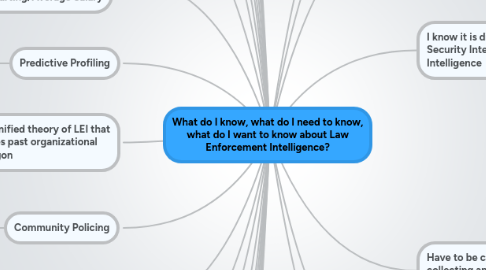What do I know, what do I need to know, what do I want to know about Law Enforcement Intelligence?
von Sources and Methods Games


1. Is there a process of sharing intelligence/resources between intelligence units?
2. what type of intelligence can be collected on persons?
2.1. ethics of investigating other police offers
3. Need to know the liaison structure with other agencies, SLTLE
3.1. Fusion Centers? JTTF?
4. Performance Measurement
4.1. Accuracy of estimates
5. How is LE intel treated in other countries?
5.1. International
6. I know it is different from National Security Intelligence and Competitive Intelligence
6.1. Law Enforcement Intelligence needs to understand what can and can't be presented in court. National Intelligence does not have to worry about this
6.2. Need to know organizational structure of whichever place I apply
6.3. Need to know how the organization works and its resources for intelligence
6.4. Need to know how to interact with the patrol officers in order to best receive useable information for intelligence
7. Have to be careful about collecting and keeping information files
7.1. Are there guidelines available for deciding what you can collect and keep?
7.1.1. How long can you retain information?
7.1.2. An intel analyst cannot violate a citizen's rights
7.2. Database Management
7.2.1. how much information to share with public?
7.2.2. Use of Open Source intelligence
8. Application of LEI against US citizens vs foreigners
8.1. Individual's civil rights
9. What can't I collect
9.1. Collection methods: covert vs overt
9.1.1. is covert collection legal?
9.2. Why can't I collect it?
9.2.1. When can I be prosecuted for improper use of LEI?
10. How does the intelligence cycle differ from small police departments to large ones?
10.1. Since the Intelligence Cycle is an on-going process, why is "evaluation" a specified step?
10.2. How much does the Law Enforcement Intelligence community work together?
11. Laws. 28 CFR Part 23
11.1. Memorandum of Agreement vs. Mutual Aid Pact
12. How does law enforcement intelligence interact with national security intelligence?
12.1. law enforcement intelligence is constrained by US law
12.1.1. how does the community interact with law enforcement intelligence?
13. Interaction with the general population
13.1. Elicitation
13.2. Solicitation
14. What kind of education/work experience is required to become a law enforcement intelligence analyst?
15. What tools are available for LE Intell Analysts
15.1. Statistical Programs
15.2. Mapping Programs
15.3. Information and Intelligence Databases
16. Need to know: Opportunities (Local, International)? Starting/Average Salary
16.1. Internships?
17. Predictive Profiling
17.1. Law
17.2. Ethics
18. A unified theory of LEI that goes past organizational jargon
18.1. Process Improvement
18.1.1. Flow
19. Community Policing
19.1. Community Led-policing should be expanded to include Intelligence-led policing
19.2. B
20. Can "standards" ever be set? Statewide? Nationwide? By who?
20.1. Standardized Framework
20.2. Should they?
21. Where in the nation was Law Enforcement Intel first used?
21.1. At what level of government?
22. How do turf wars between agencies and jurisdictions affect the process?
23. What is the demand for Law Enforcement analysts?
23.1. How many law enforcement analysts are in the United States currently?
23.2. Sworn vs. Non-Sworn?
23.2.1. Clearance?
23.2.2. Do most LE analysts handle non-classified data?
24. How much is the collection process restricted by the need to make sure information will be able to go to court?
24.1. The goal is that information must be admissible in court.
24.1.1. Application of LEI in prosecution
24.1.1.1. Need to know how to make intelligence products useable and admissible in a court of law
25. How to get past organizational rivalries in information sharing
25.1. Information Sharing
25.1.1. State vs. Local vs. Federal - what are the differences? problems?
